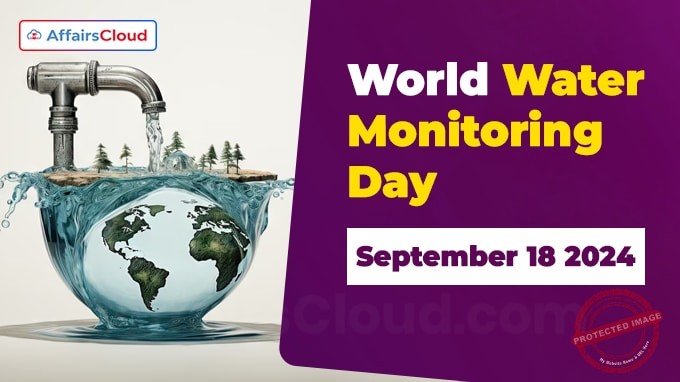 World Water Monitoring Day (WWMD) is annually observed across the globe on 18 September, to raise awareness about the importance of monitoring water quality issues and promote public involvement in protecting water resources.
World Water Monitoring Day (WWMD) is annually observed across the globe on 18 September, to raise awareness about the importance of monitoring water quality issues and promote public involvement in protecting water resources.
- WWMD is an international education and outreach program encouraging people to regularly monitor their local water bodies.
The 2024 theme for World Water Monitoring is, “Water For Peace“.
Background:
World Water Monitoring Day (WWMD) was established in 2003 by the American Clean Water Foundation (ACWF) as a global educational program.
- The program was subsequently named the EarthEcho Water Challenge (EEWC) (formerly World Water Monitoring Challenge (WWMC)) to build public awareness and engagement in water conservation around the world.
ii.WWMD is officially celebrated on September 18, but initially, the date was 18 October, honouring the United States of America (US) Clean Water Act, which was enacted in 1972 by the US Congress to restore and protect the water resources of America.
Why changed from 18 October to 18 September?
In 2007, the official date of WWMD was changed to 18 September to facilitate global participation in parts of the world where the water bodies usually freeze during October.
- The date change to 18 September has maximised the number of participants and participating countries globally fostering a commitment to monitoring and preserving water resources.
Points to Note:
i.In 2006, the ACWF transferred the role of coordinator of the event to the Water Environment Federation (WEF) and the International Water Association (IWA).
ii.In 2009, the program introduced an extended monitoring period from March 22 until December 31, to accommodate monitoring exercises at other times during the year.
- During this time, people of all ages throughout the world community will have an opportunity to monitor the quality of their local watersheds.
iii.In 2015, the coordinator of WWMD was transferred to EarthEcho International, an environmental nonprofit organisation.
EarthEcho Water Challenge (EEWC):
i.The EarthEcho Water Challenge (EEWC) is an international program of EarthEcho International that runs annually from March 22 (the United Nations (UN) World Water Day) through December.
ii.It equips young leaders around the world to become community scientists, testing their local water quality, to combat the global water crisis starting in their communities.
Key Facts:
1.More than 3 billion people worldwide depend on water that flows across national borders.
2.Out of 153 countries with shared water bodies, only 24 have established cooperation agreements to govern them.
3.According to the United States Geological Survey (USGS):
i.The vast majority of water on the Earth’s surface, over 96%, is saline water in the oceans.
ii.Of the total freshwater, over 68% is locked up in ice and glaciers and another 30% of freshwater is found in the ground.
iii.Fresh surface water sources, such as rivers and lakes, only constitute about 22,300 cubic miles (93,100 cubic kilometers (km)), which is about 1/150th of 1% of total water.
iv.Of all the water on Earth, over 99% of Earth’s water is unusable by humans and many other living things.
4.According to the annual publication of the UN World Water Development Report (WWDR) 2024: Water for Prosperity and Peace, published by the United Nations Educational, Scientific and Cultural Organization(UNESCO) on behalf of the UN-Water, with its production coordinated by the UNESCO World Water Assessment Programme (WWAP):
i.In 2022, 2.2 billion people did not have access to safely managed drinking water, while 3.5 billion were without proper sanitation.
ii.Droughts have impacted 1.4 billion people between 2002-2021.Climate change and poor water management increase the risks of regional conflicts.
iii.The number of people exposed to floods is expected to grow from the current 1.2 billion to 1.6 billion by 2050.
iv.Water scarcity alone could cost certain countries across Africa and Asia up to 6% of their Gross Domestic Product (GDP) by 2050.
v.Despite 40% of the population living in shared water basins, only 20% of countries have formal agreements.
About the EarthEcho International:
Executive Director (ED)- Mia DeMezza
Headquarters– Washington, DC, the United States of America (USA)
Founded in– 2005




